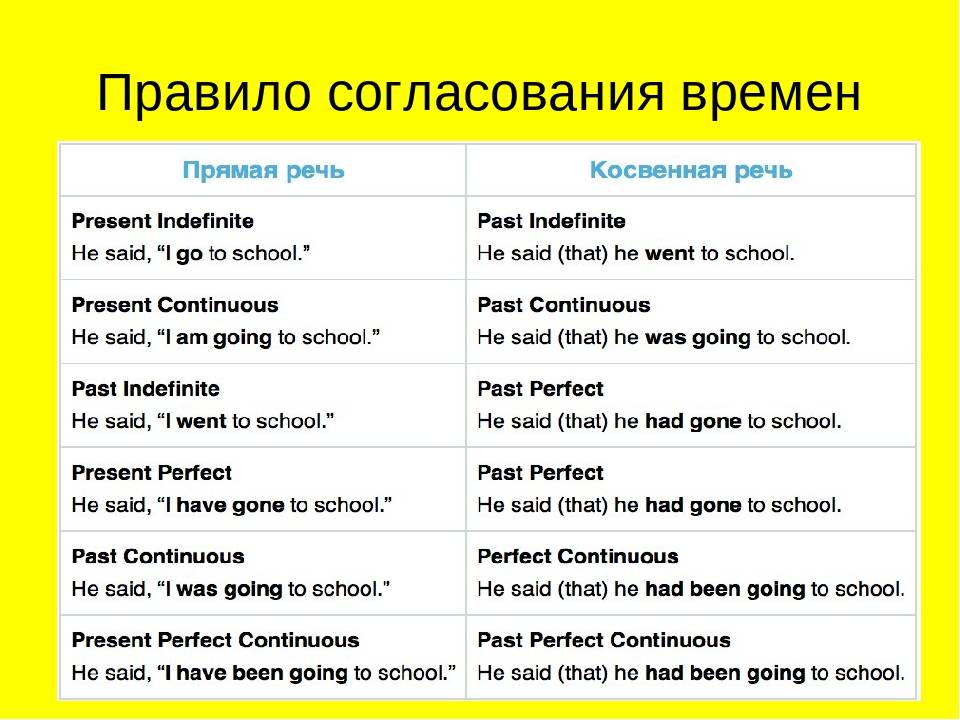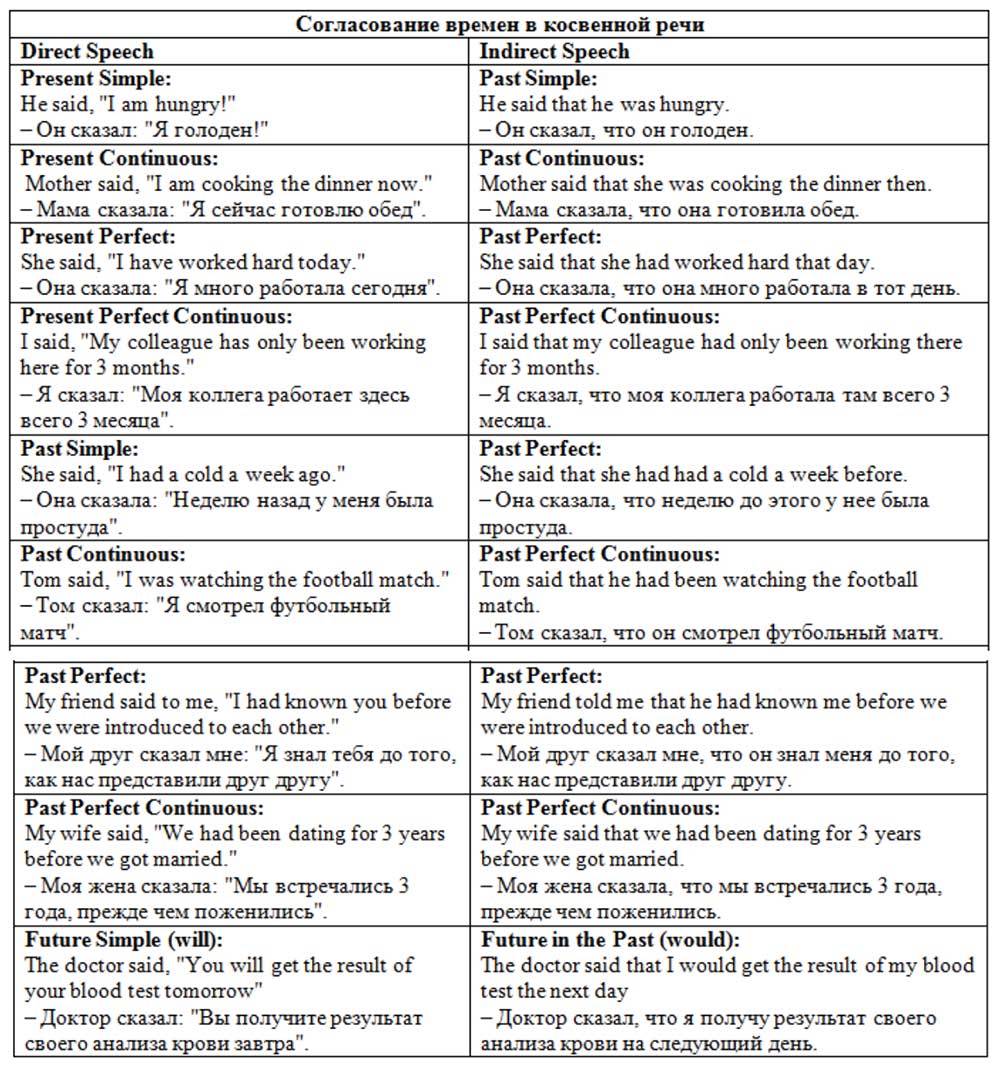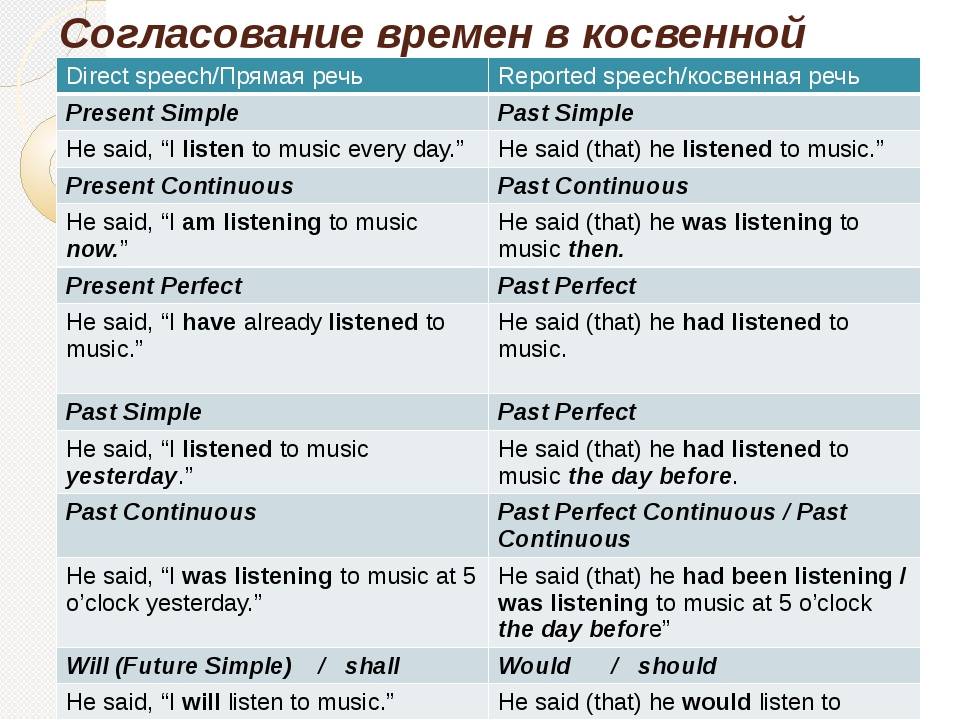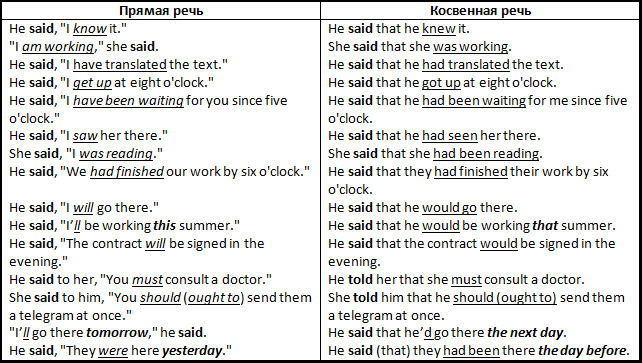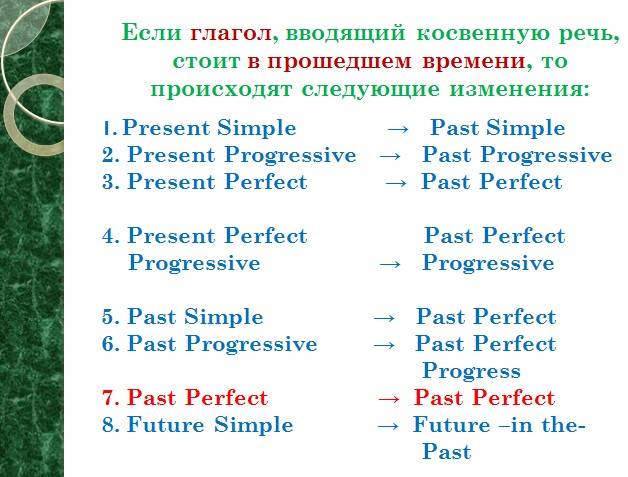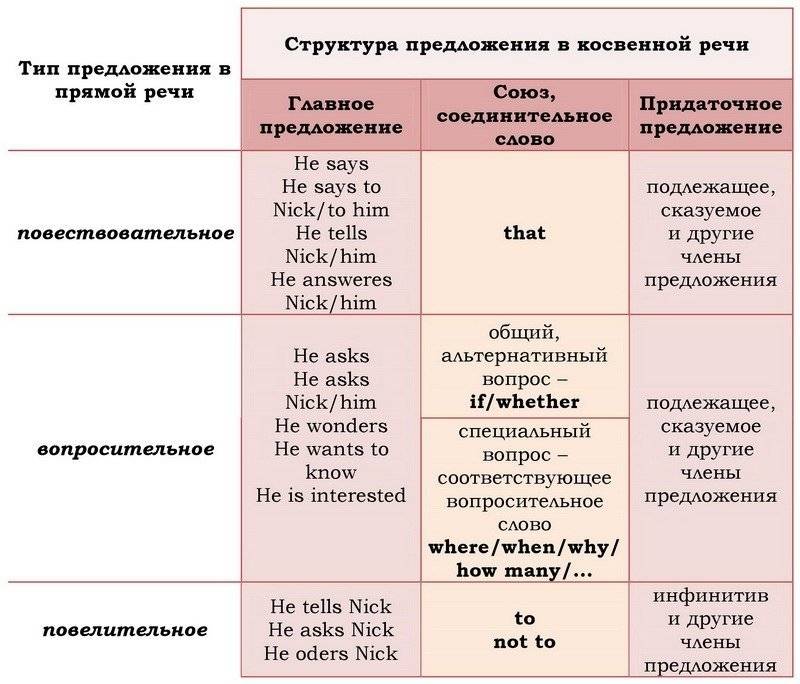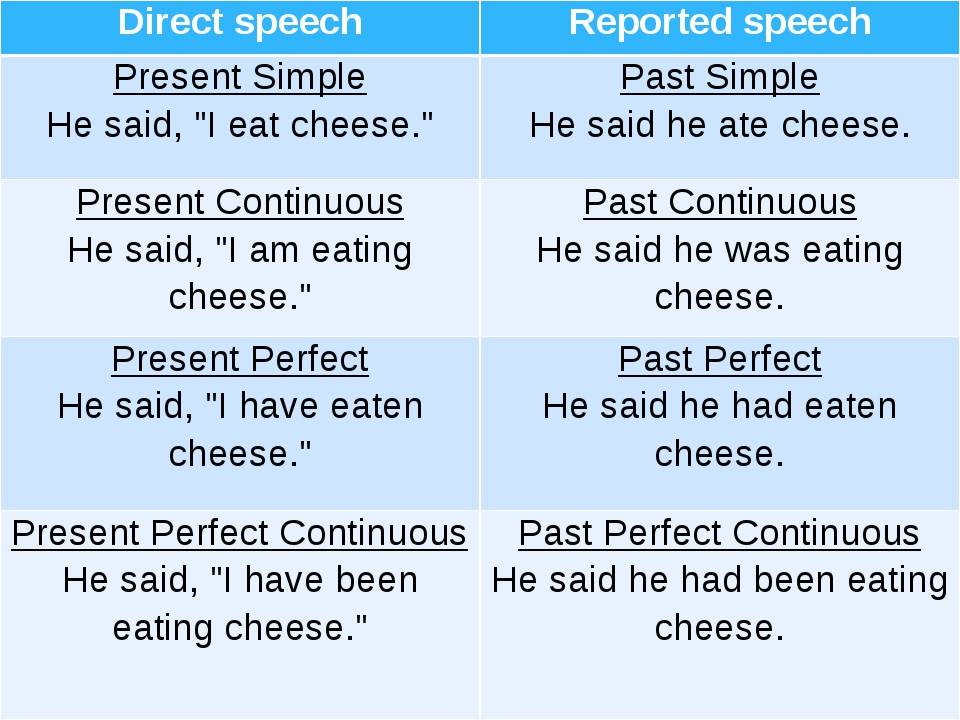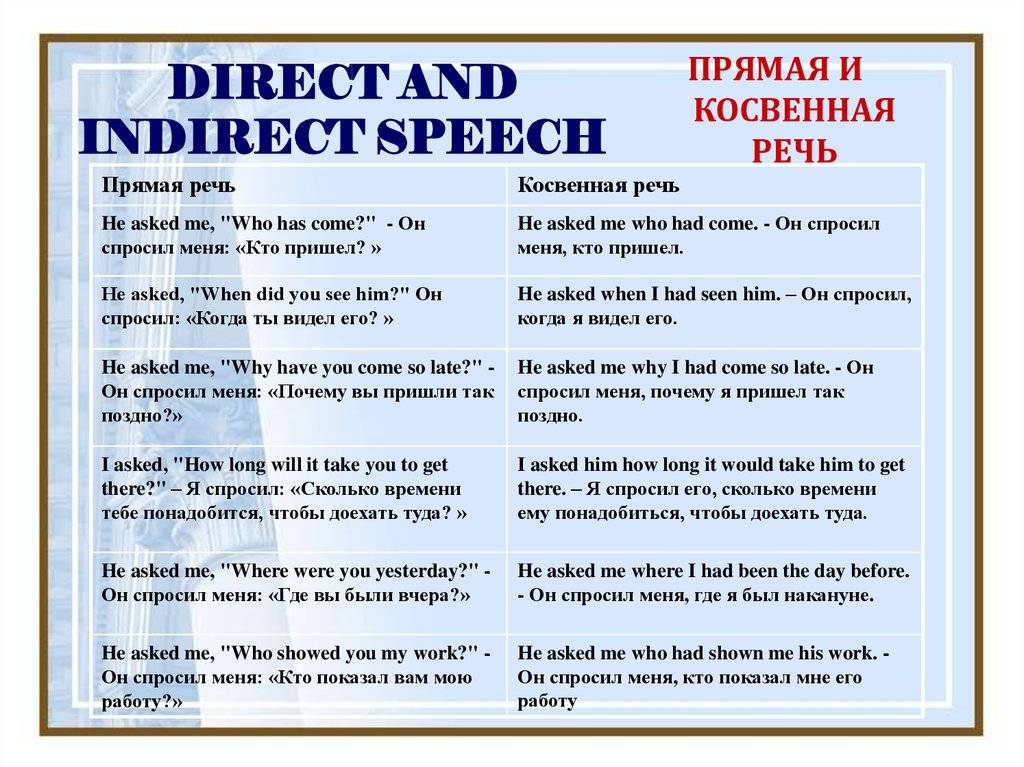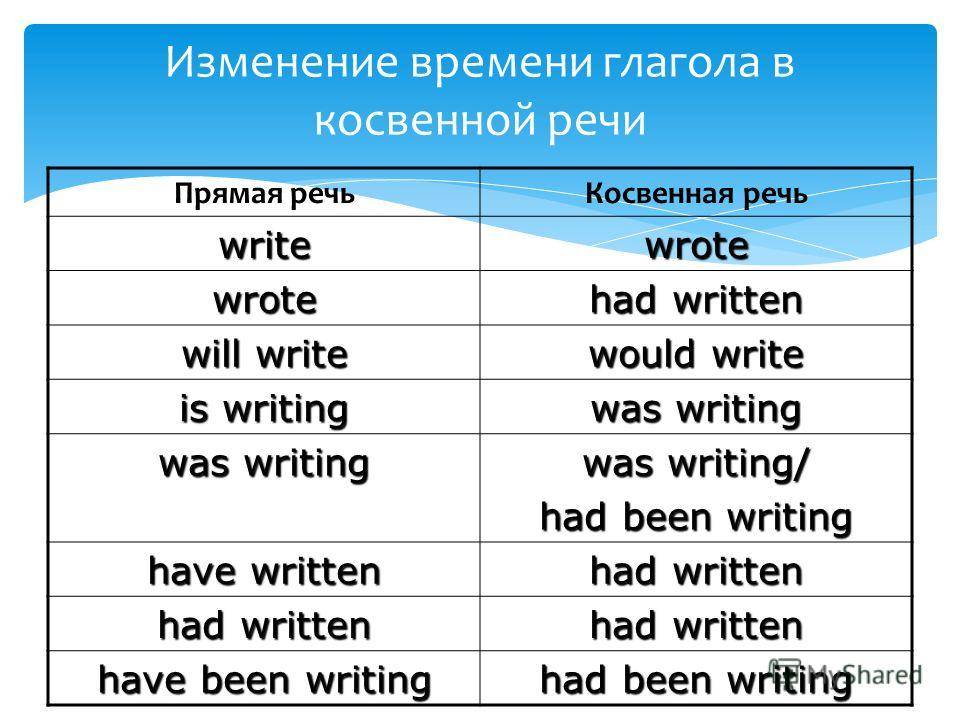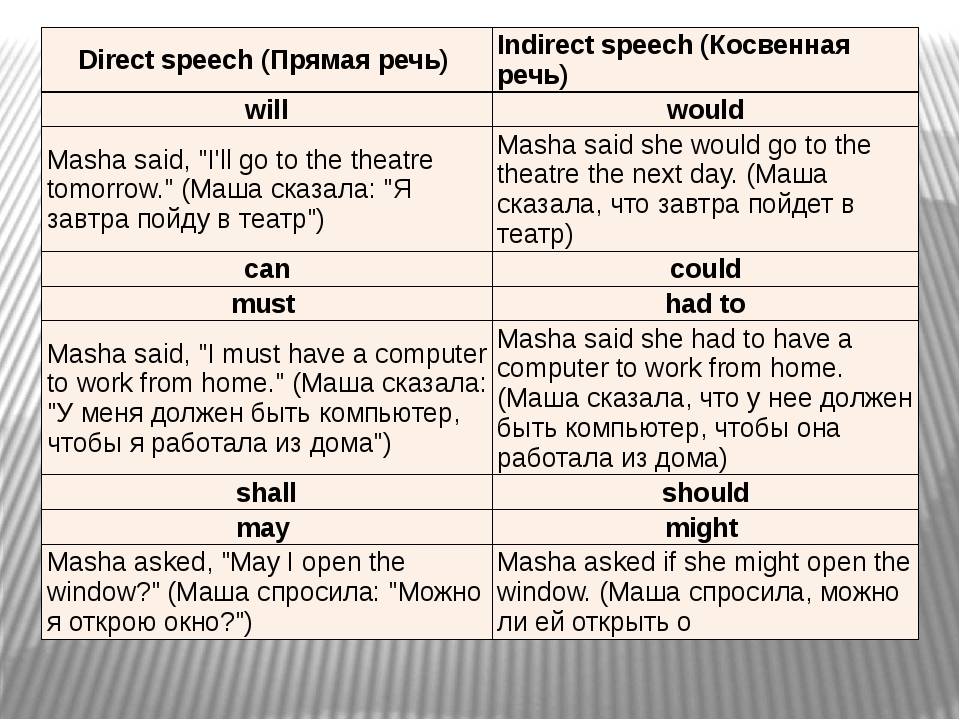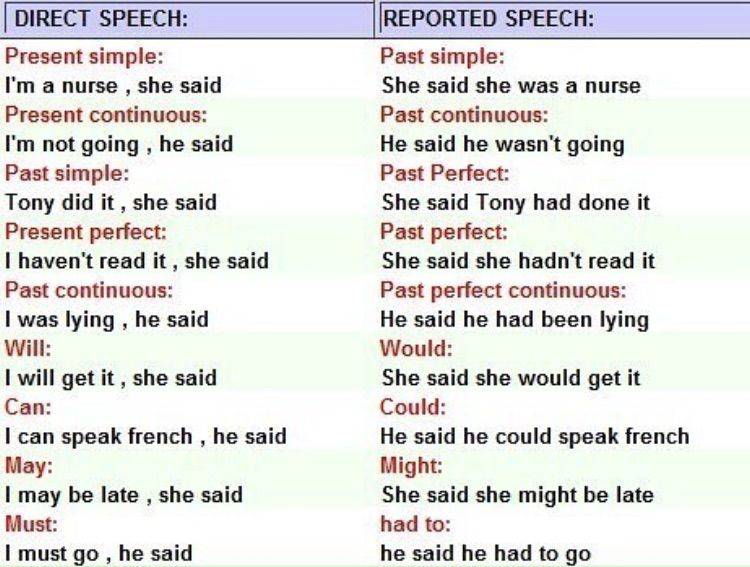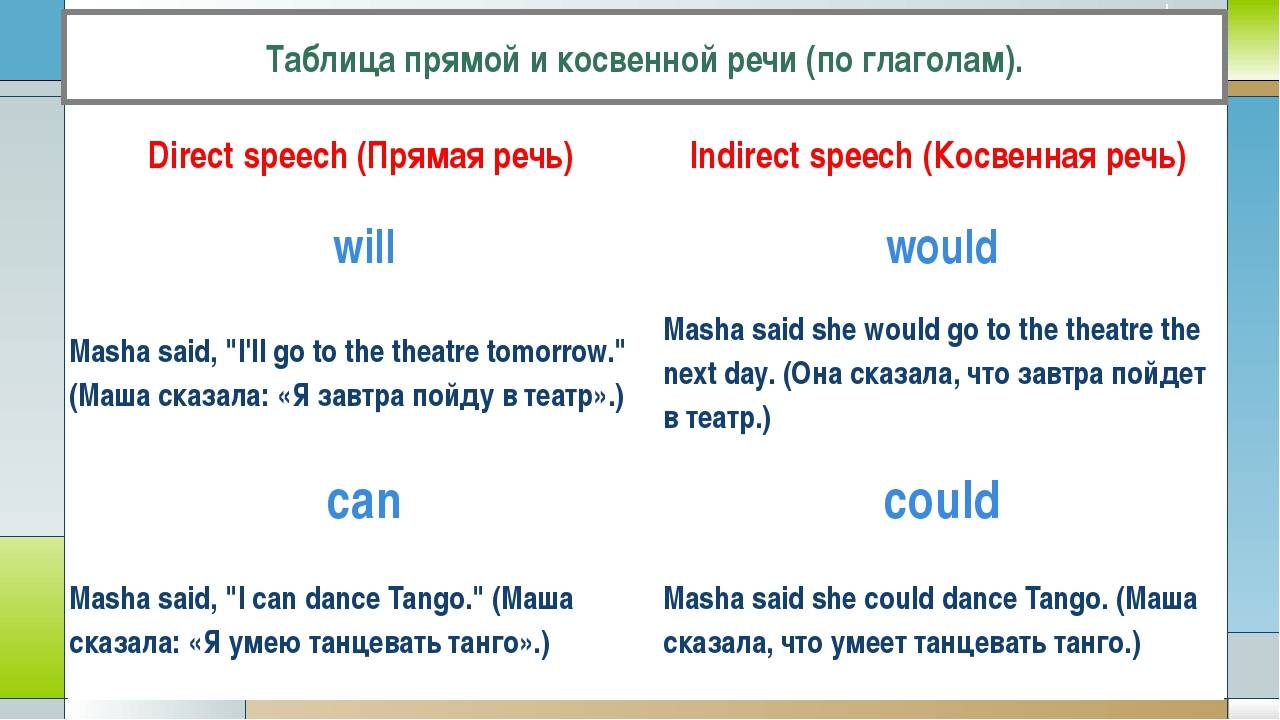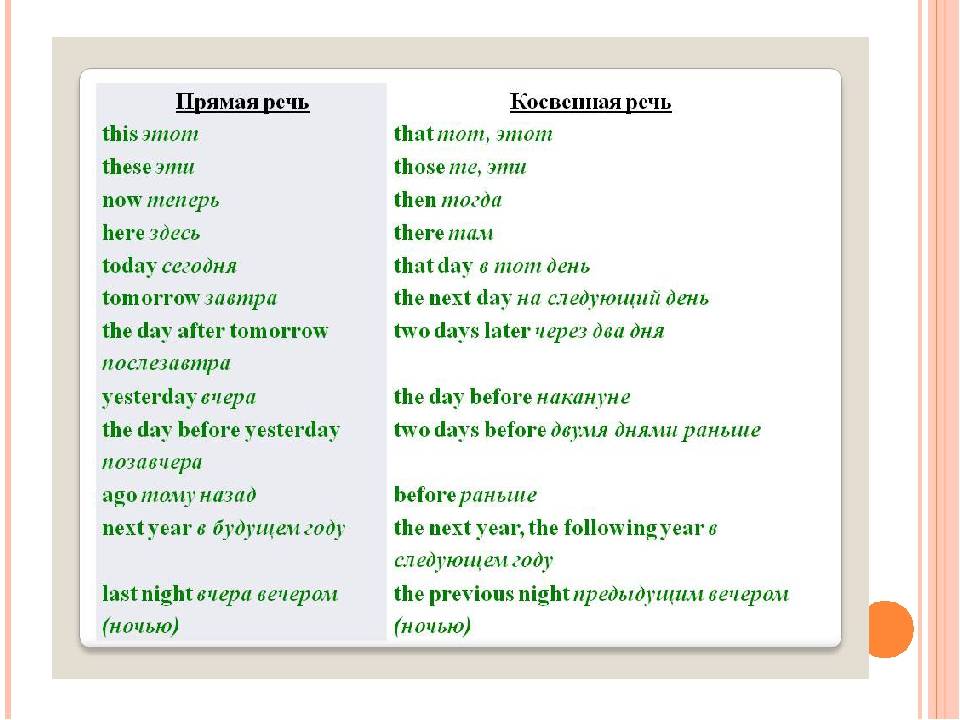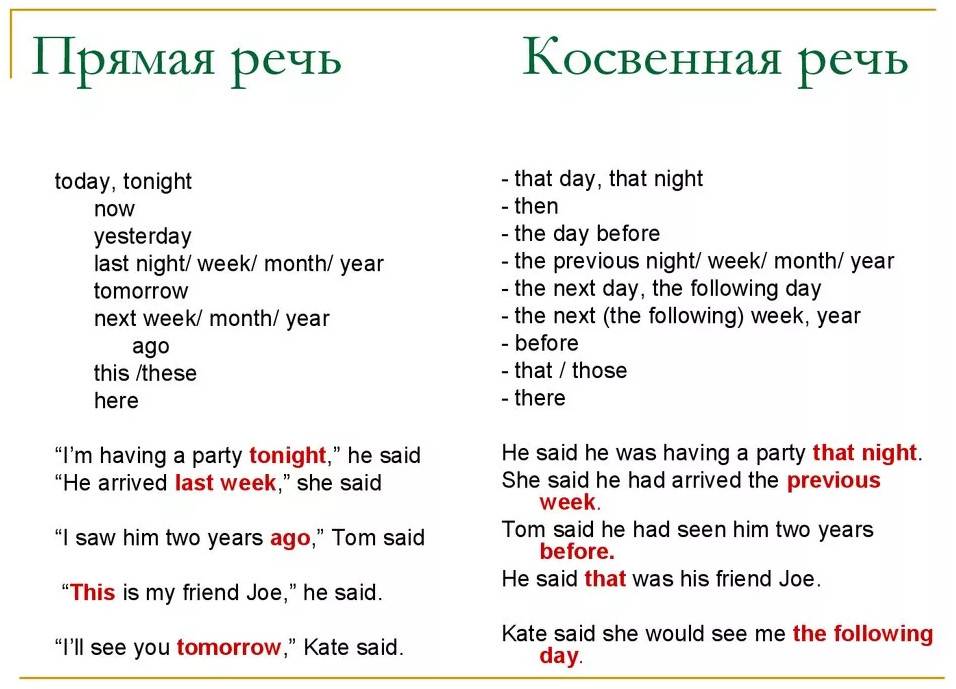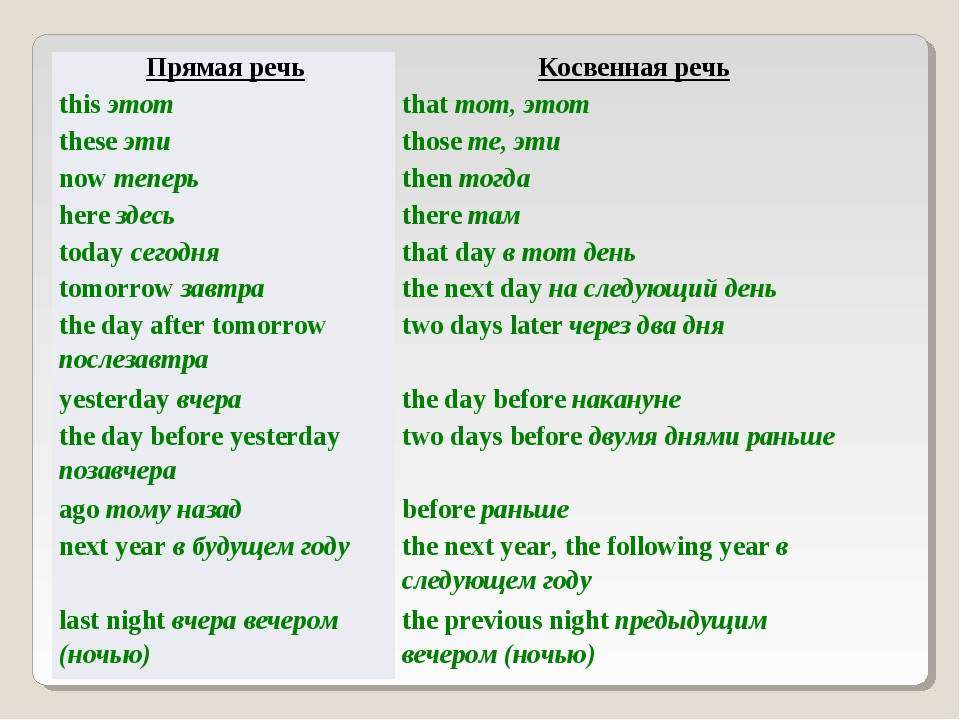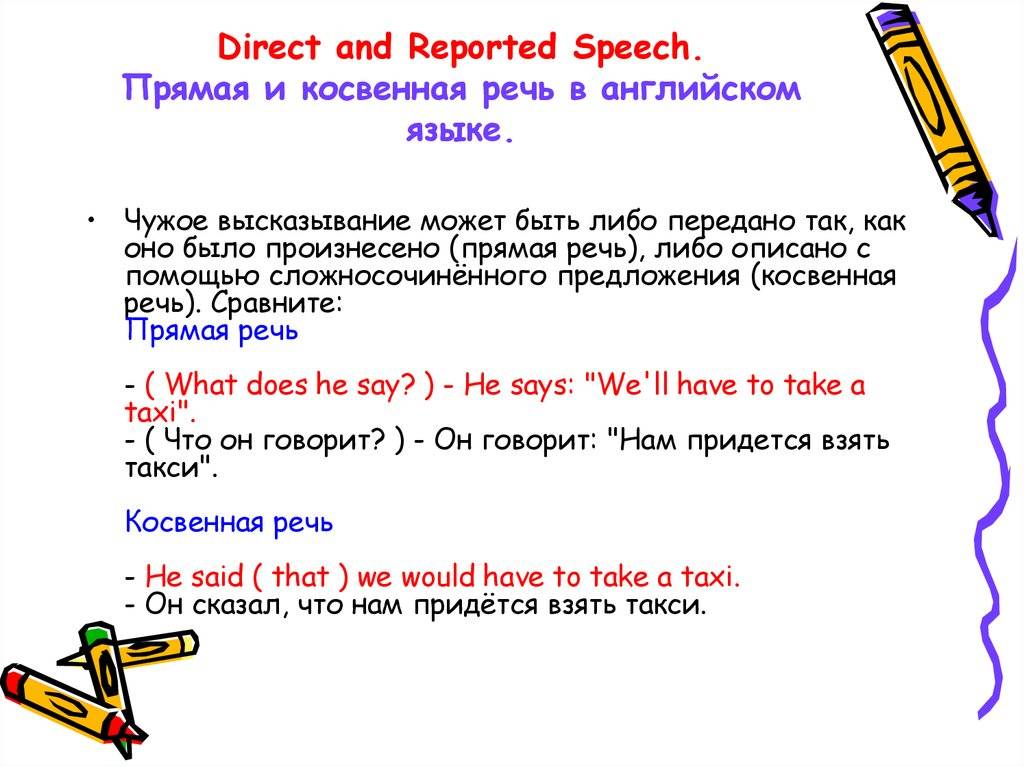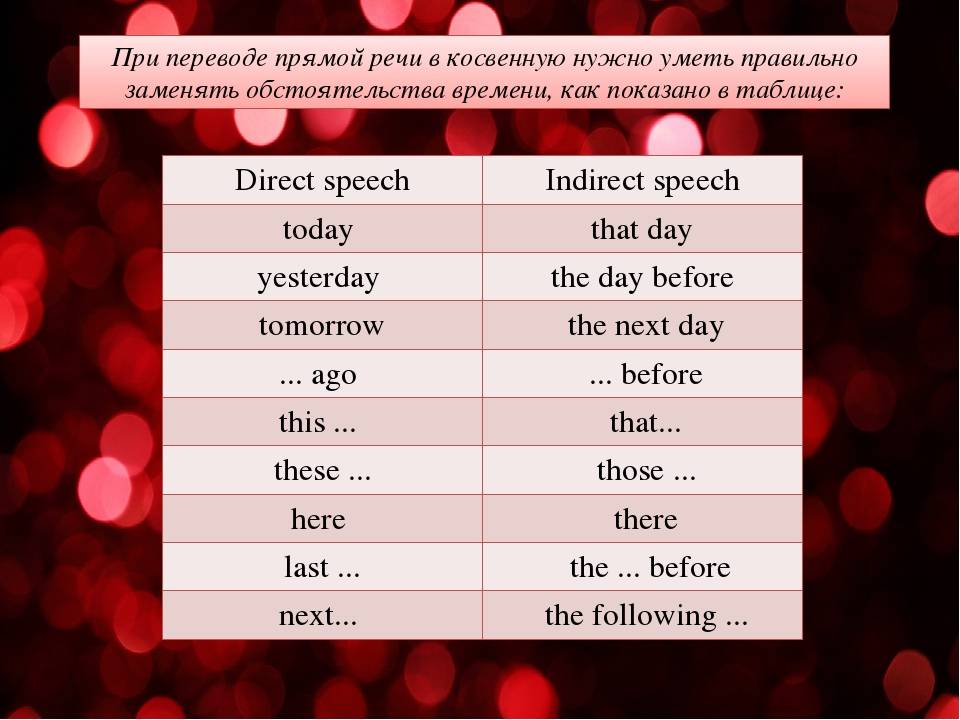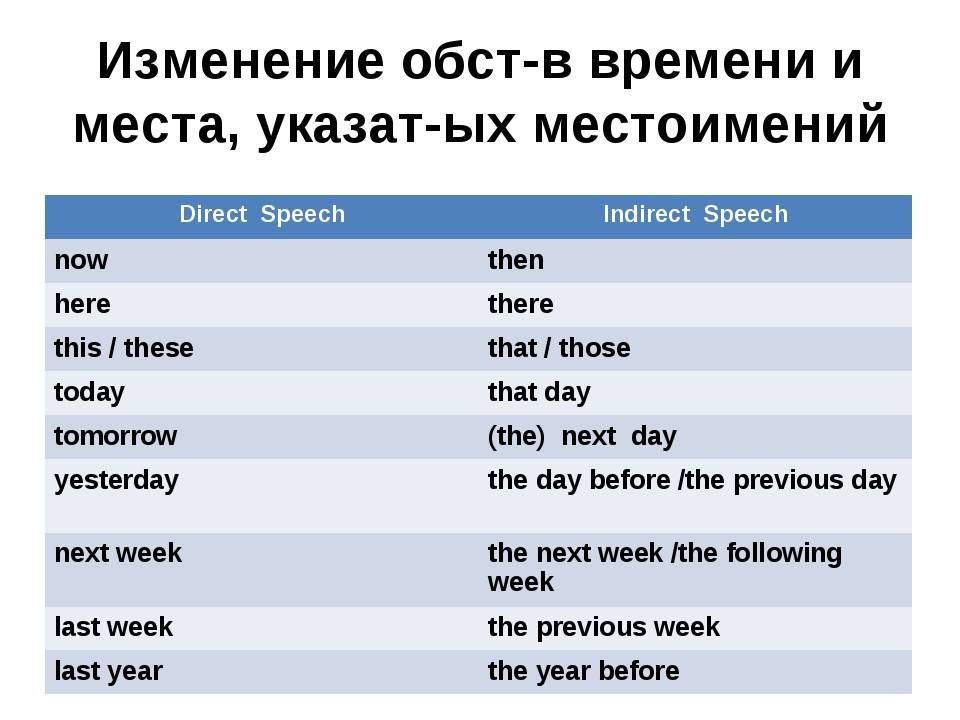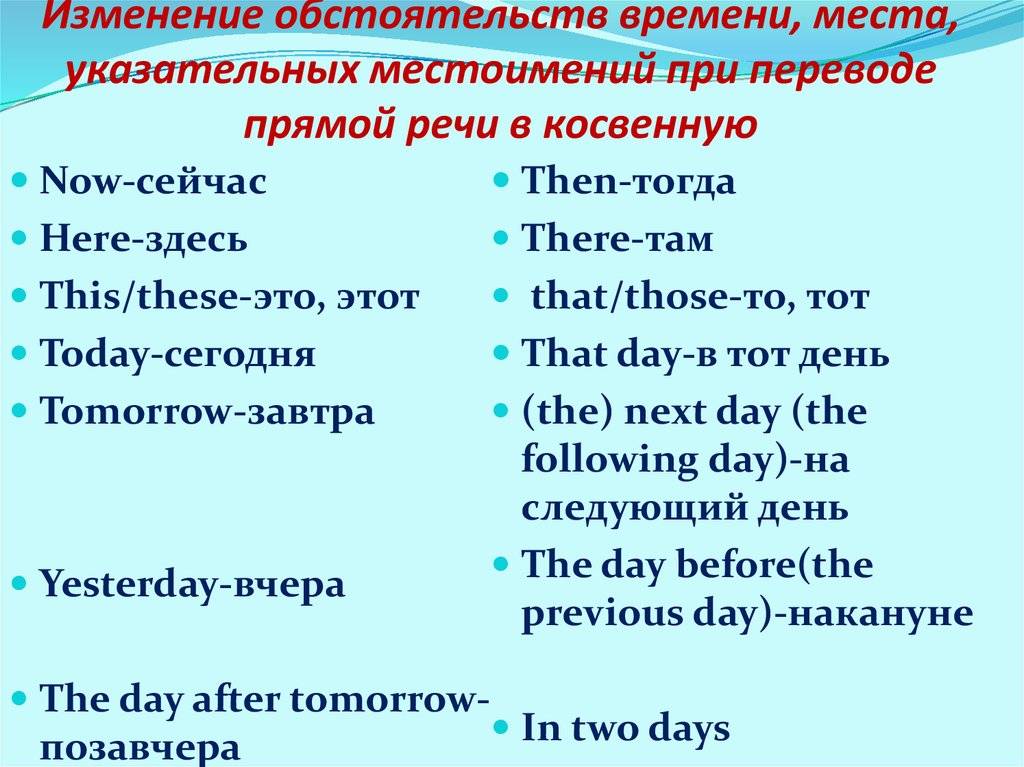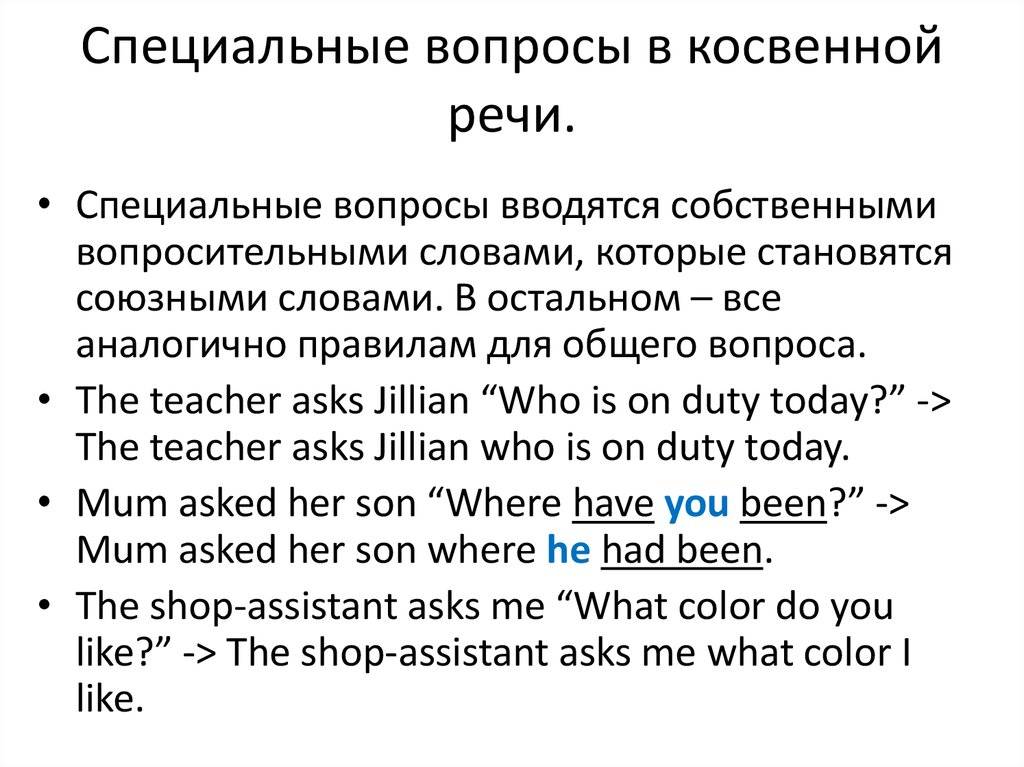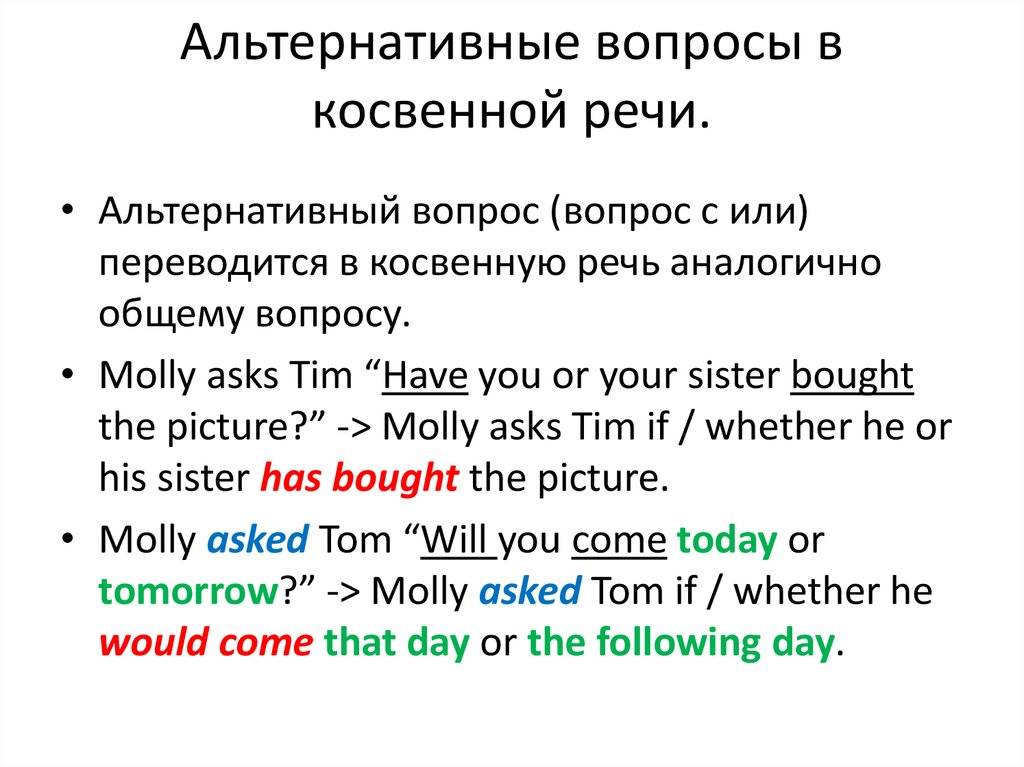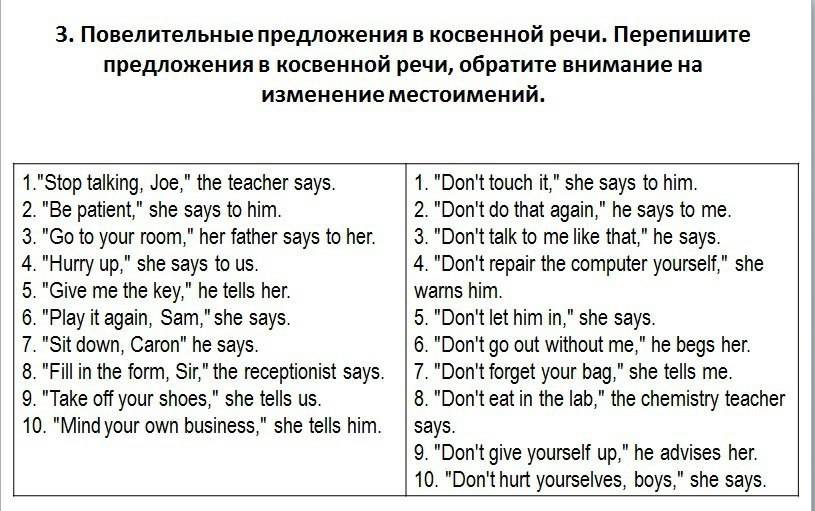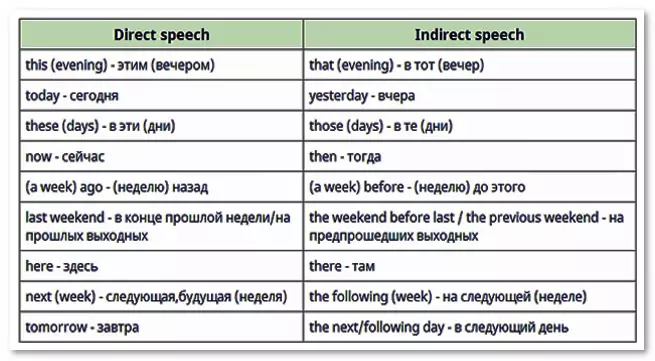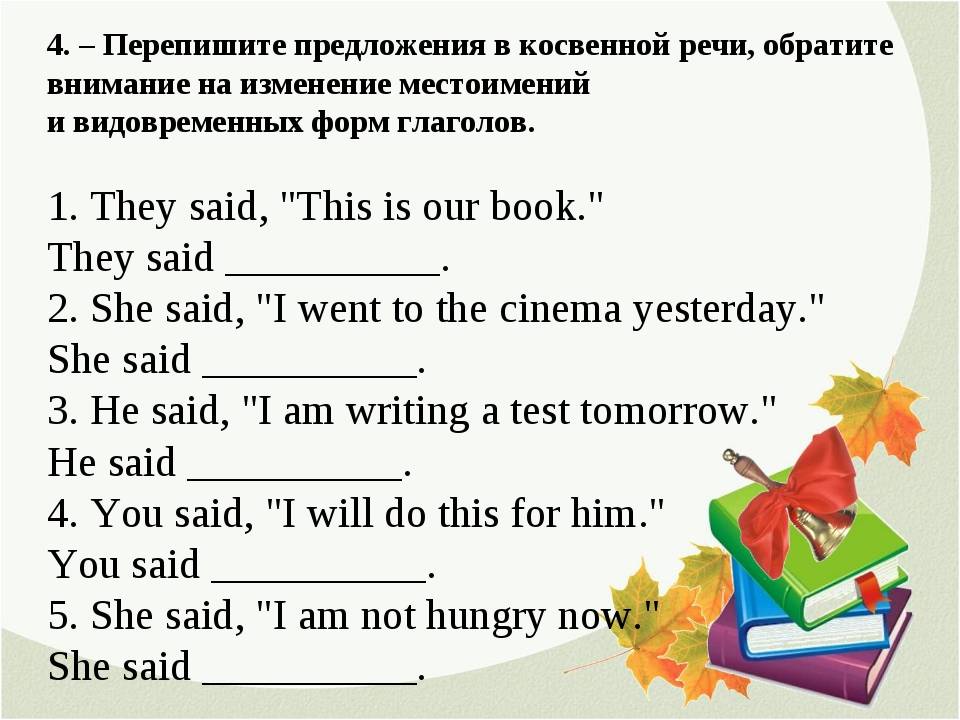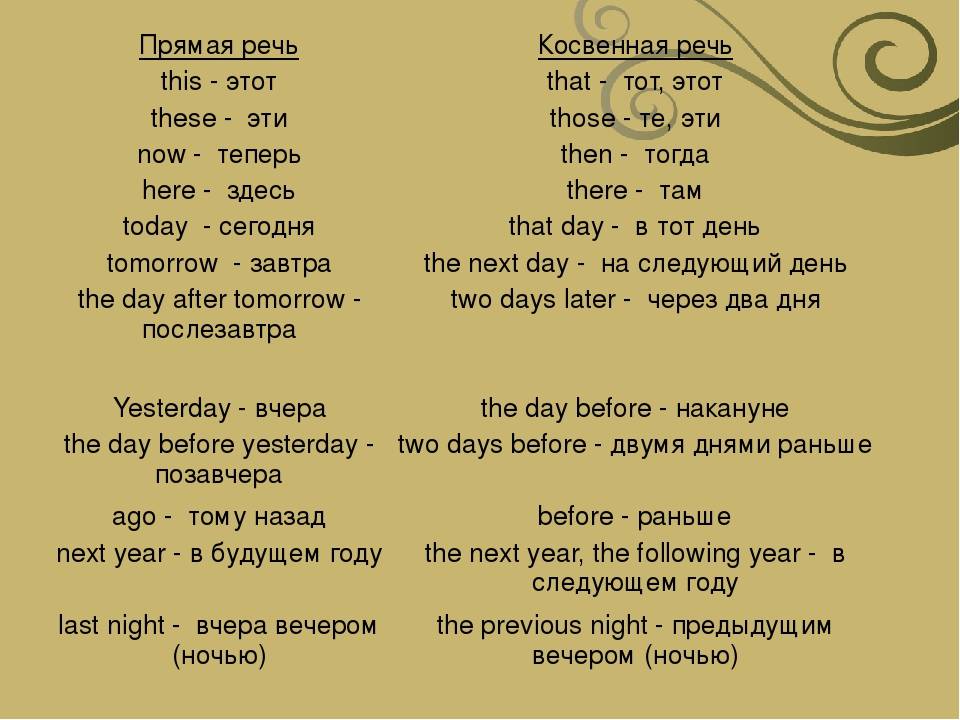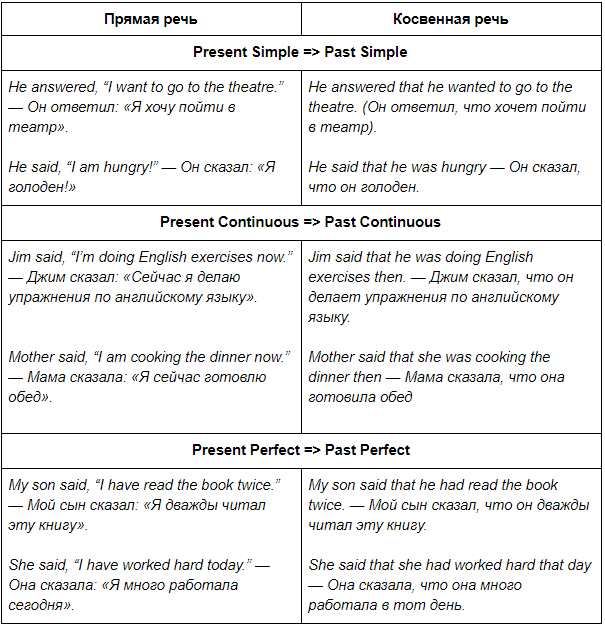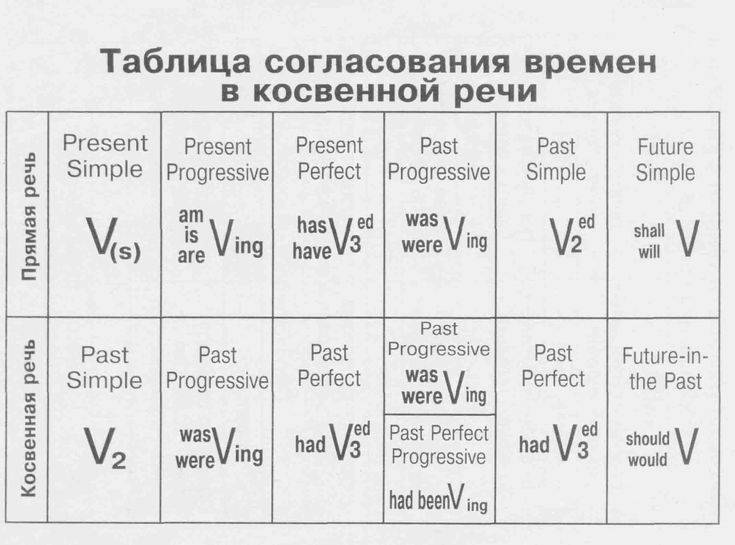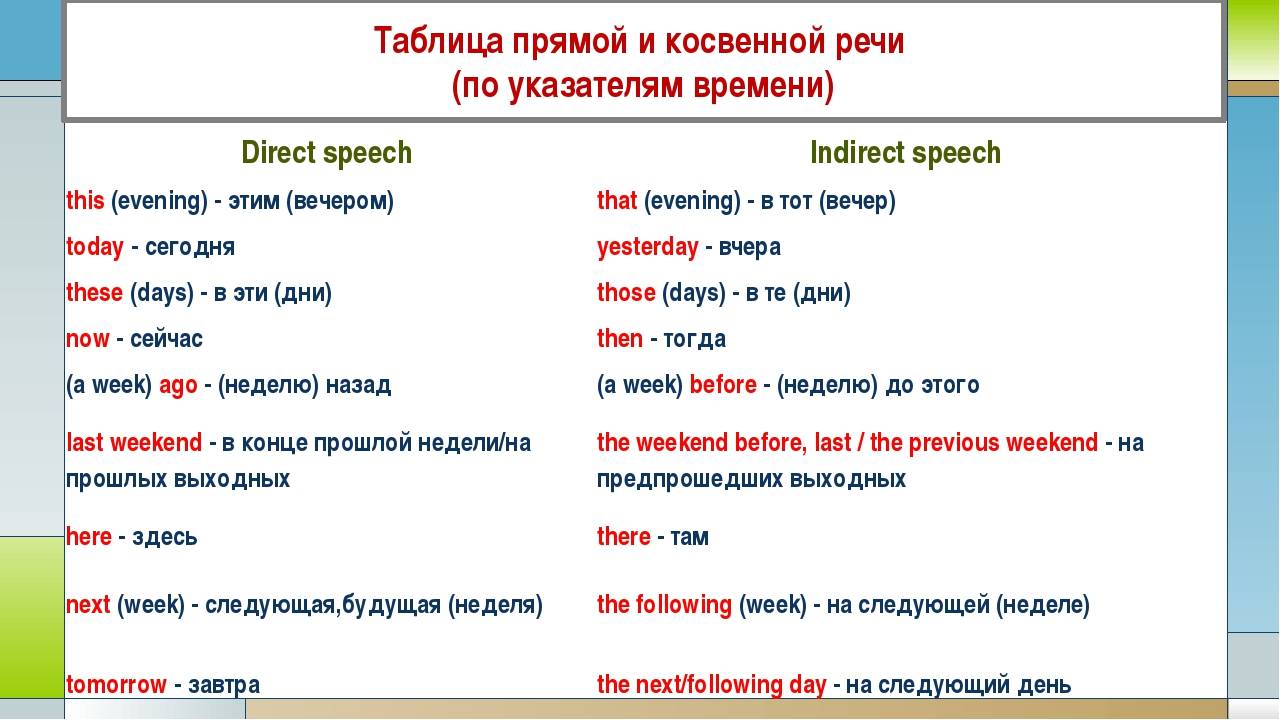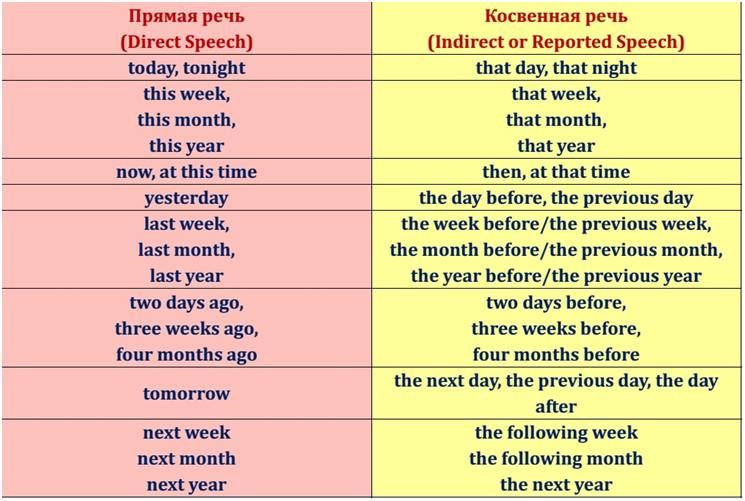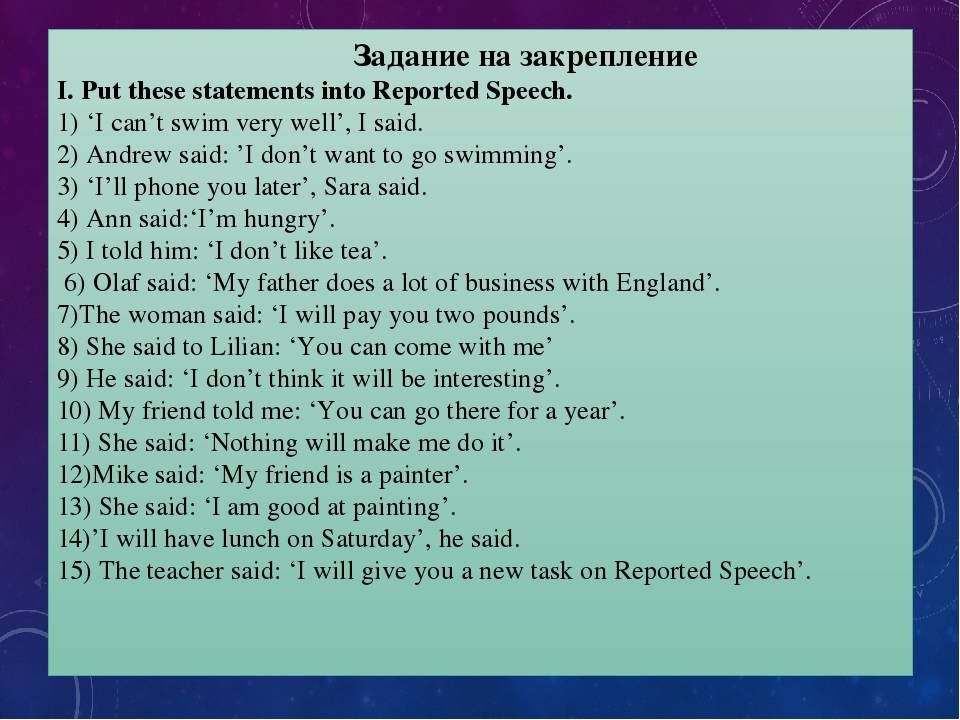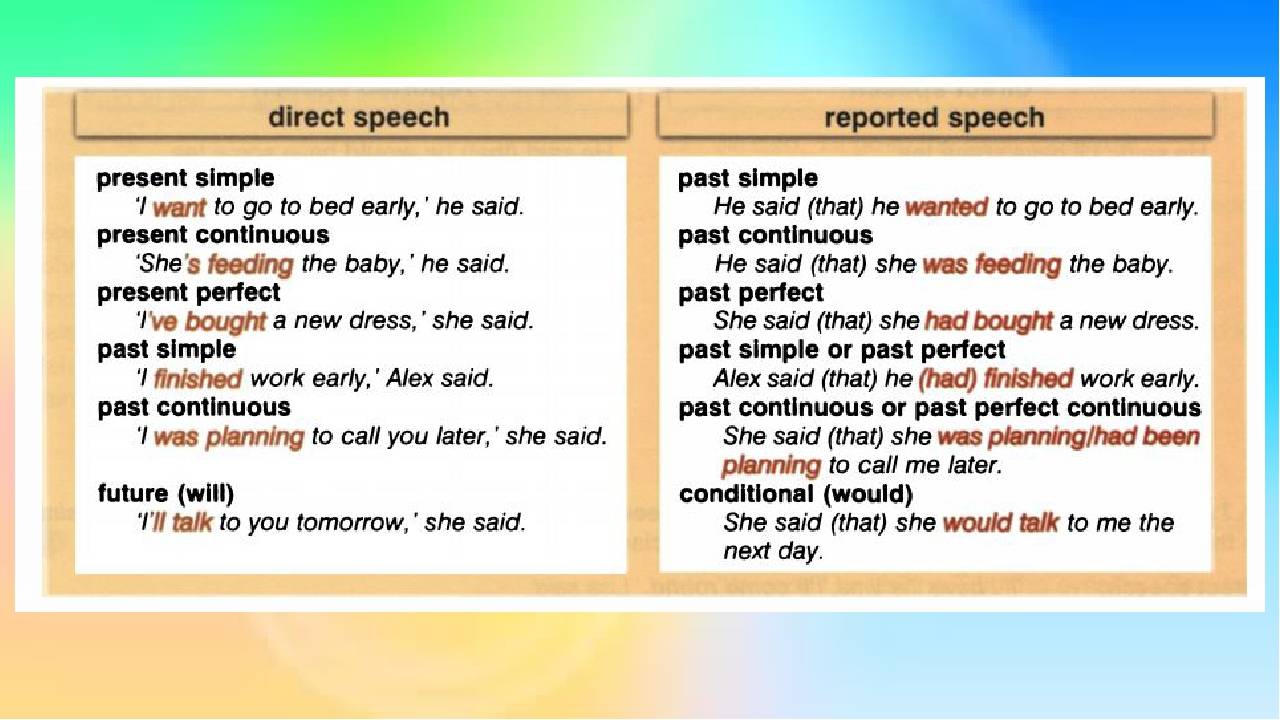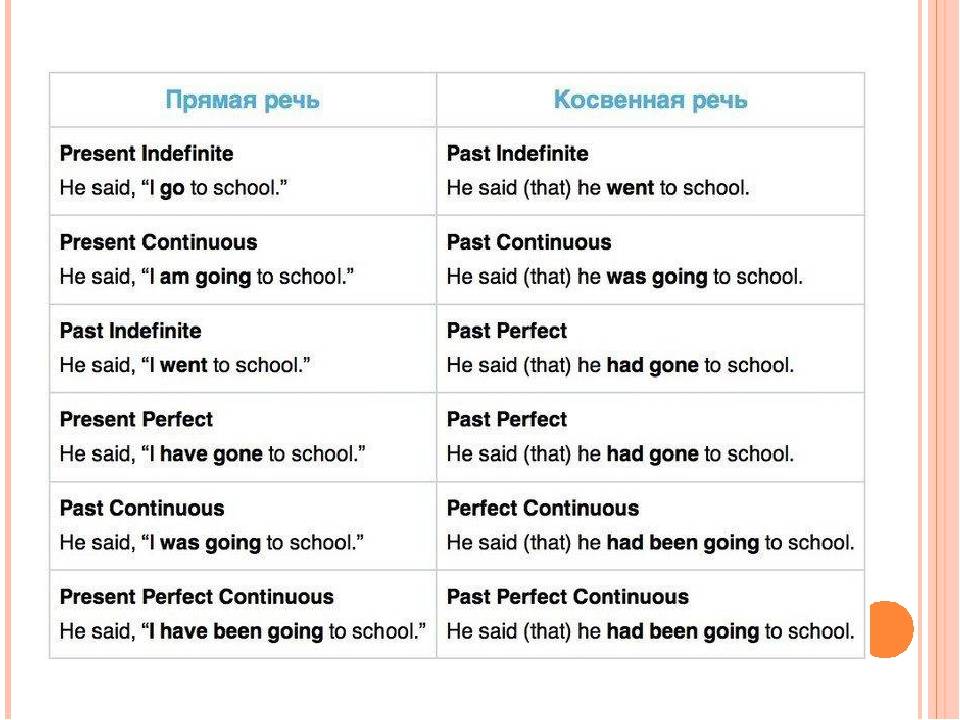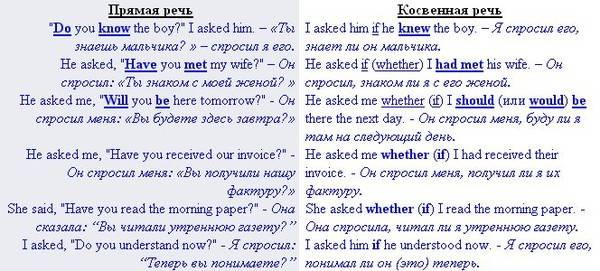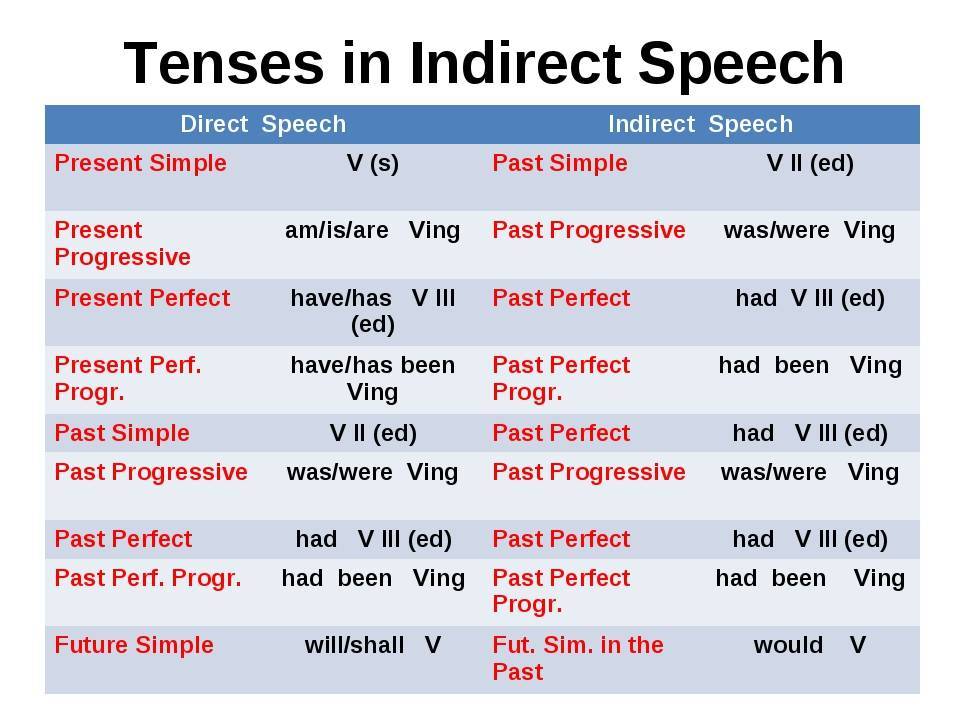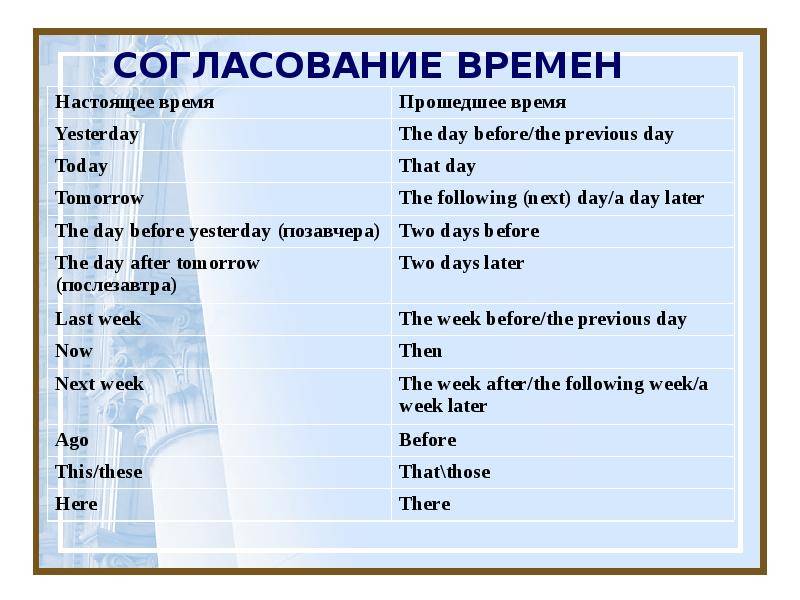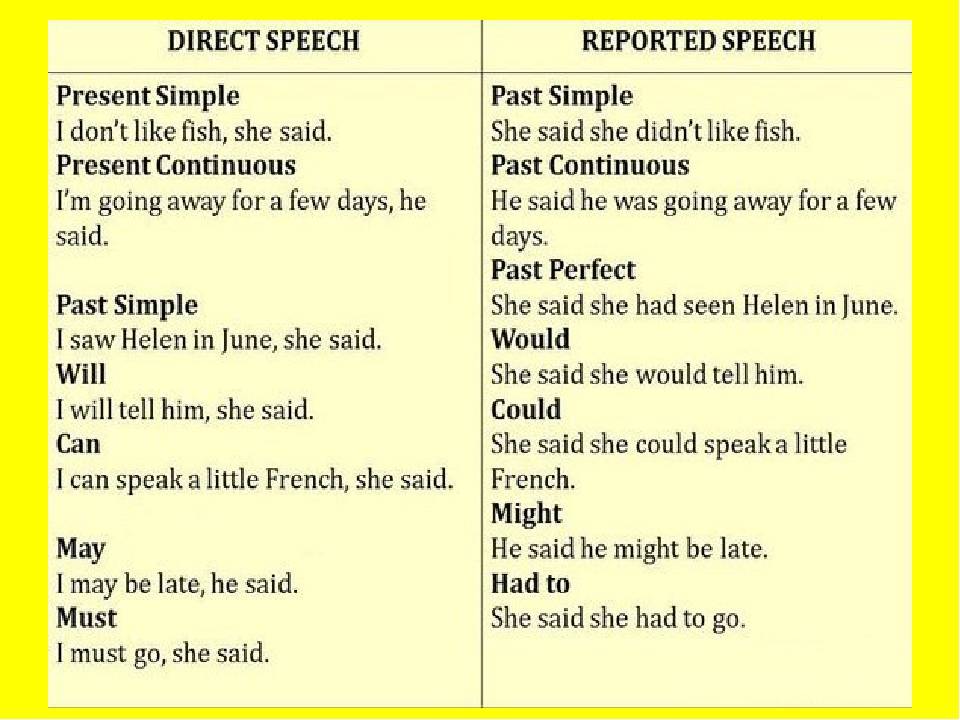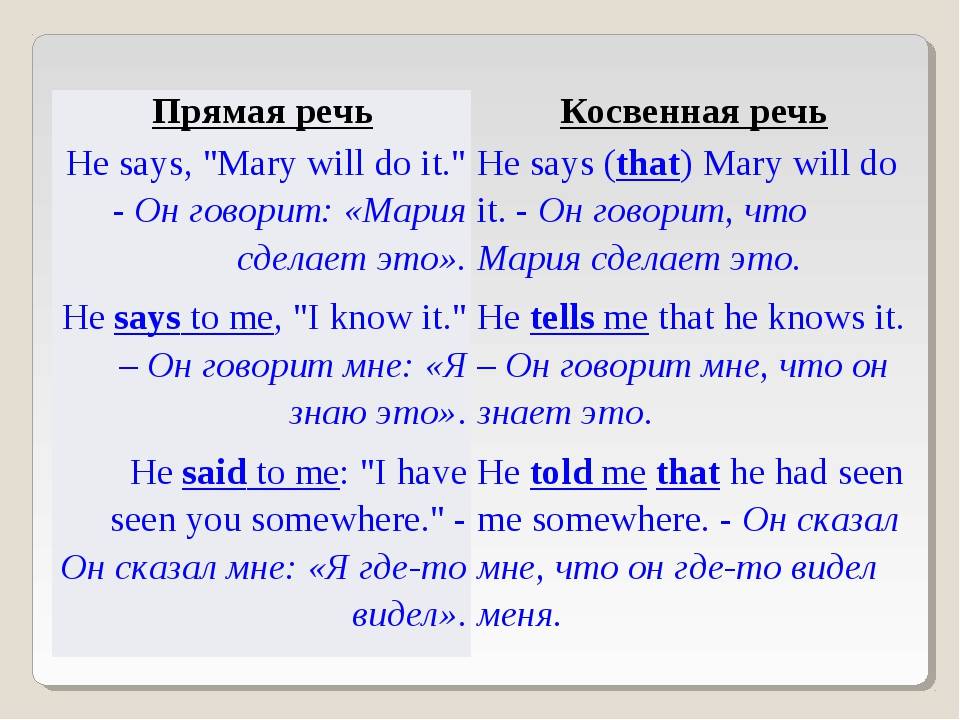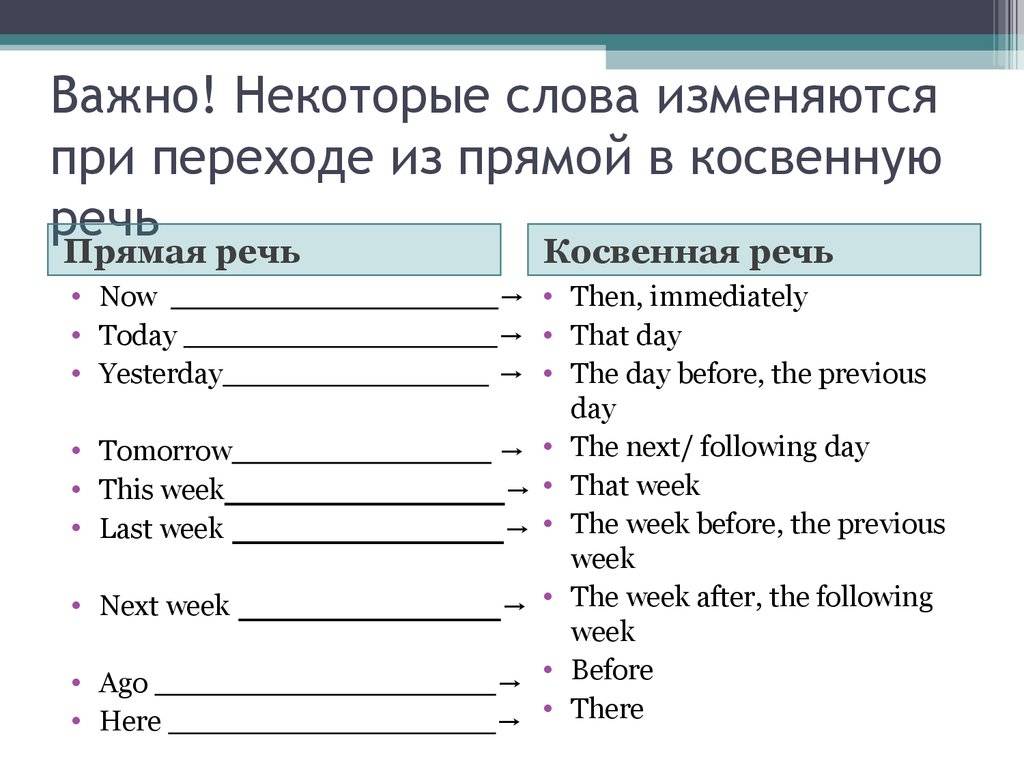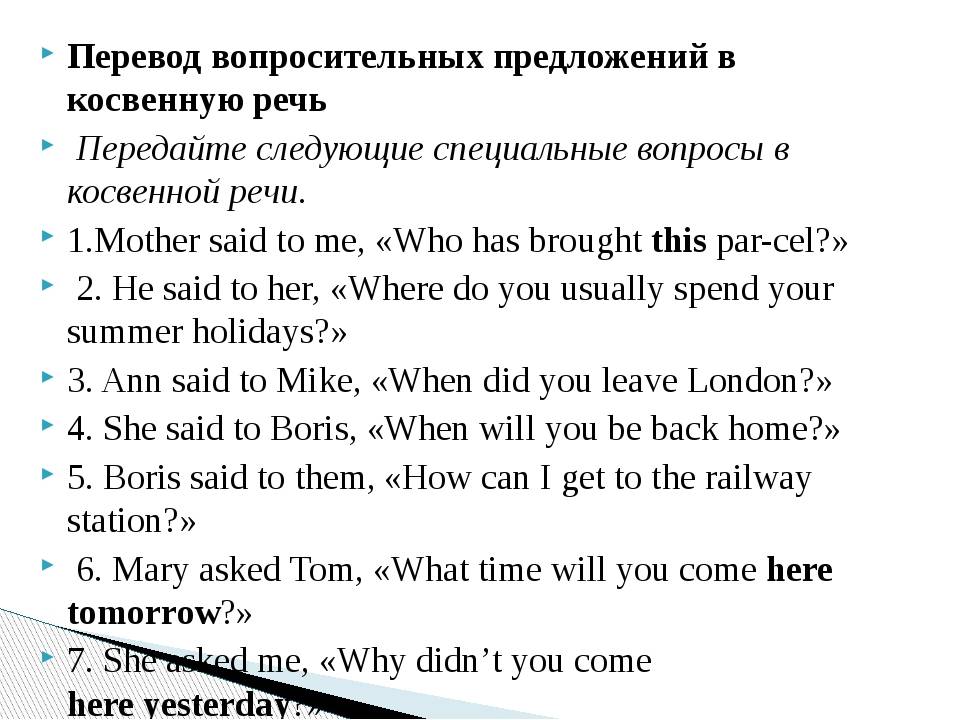Тест на понимание косвенной речи
скоро
На этом можно закончить. Что собой представляет косвенная речь и как она строится, Вы, внимательно изучив статью выше, теперь знаете. Если желаете полностью освоить косвенную речь, то далее, дополнительная часть статьи для Вас.
Модальные глаголы
При изменении прямой речи в косвенную необходимо также обращать внимание, есть ли в предложении модальные глаголы. Как и главные глаголы, они должны изменяться в косвенной речи, однако не все модальные глаголы можно изменять
Изучите таблицы ниже.
| Direct Speech | Indirect Speech |
| CAN → COULD | |
|
“I can drive a car.” She said, “He can play a violin.” “We can climb on a hil.” |
He said he could drive a car. She said that he could play a violin. They said they could climb on a hill. |
| MAY → MIGHT | |
|
“I may buy a computer.” She said, “He may visit a doctor.” “They may go to zoo.” |
He said that he might buy a computer. She said he might visit a doctor. They said they might go to zoo. |
| MUST → HAD TO | |
|
“I must work hard.” She said, “They must carry on their work.” I said to her, “You must learn English.” |
He said he had to work hard. She said that they had to carry on their work. I said to her that she had to learn English. |
| Direct Speech | Indirect Speech |
| WOULD → WOULD | |
|
“I would start a business.” “We would apply for a visa.” “I would appear in the exam.” |
He said that he would start a business. They said they would apply for visa. She said she would appear in the exam. |
| COULD → COULD | |
|
“I could run faster.” “We could not learn the lesson.” “She could play a piano.” |
He said that he could run faster. They said they could not learn the lesson. She said she could play a piano. |
| MIGHT → MIGHT | |
|
“Guests might come.” “I might meet him.” “It might rain.” |
He said that guest might come. Anna said she might meet him. She said it might rain. |
| SHOULD → SHOULD | |
|
“I should avail the opportunity.” “We should take the exam.” “I should help him.” |
He said that he should avail the opportunity. They said they should take the exam. She said that she should help him. |
| OUGHT TO → OUGHT TO | |
|
He said to me, “You ought to wait for him.” “We ought to attend our classes.” “I ought to learn method of study.” |
He said to me that I ought to wait for him. They said that they ought to attend their classes. She said that she ought to learn method of study. |
Время и наречия
Время и наречия в косвенной речи также изменяются. Примеры:
| Direct Speech | Indirect Speech |
|
todaytomorrowyesterdaynext week/month/yearlast week/month/yearnow/justagoherethis/these |
that day/the same daythe next day/the following daythe day before/the previous daythe following week/month/yearthe previous week/month/yearthenbeforetherethat/those |
Повелительные(imperative) и восклицательные(exclamatory) предложения
В косвенных повелительных и восклицательных предложениях, чаще всего согласование времён отсутствует. В зависимости от контекста могут заменяться глаголы said, told, advised и т.п.
Повелительные предложения
Предложения повелительного наклонения — это предложения приказа, требования, предложения, совета и т.п. Например: “открой двери”, “помоги мне”, “учи уроки”. Очень часто используются такие слова, как requested, ordered, advised, suggested, forbade и not to do something.
Восклицательные предложения
Восклицательные предложения – это выражение радости, печали, удивления и т.п. Например: “Ура! Мы победили”, “Увы! Ты опоздал” или “Ого! Классно выглядишь ”. Очень часто используются такие слова, как exclaimed with joy, exclaimed with sorrow, exclaimed with wonder и т.д.
Использование say, tell, ask
SAY (сказать) hello, good morning/afternoon (доброе утро/день), something/nothing (что-то/ничего), so (так), a prayer (молитву), a few words (несколько слов), no more (досл. — не больше, с say — больше ничего не говори, замолчи), for certain/sure (наверняка)…
TELL (говорить, рассказывать) the truth (правду), a lie (ложь), a story (историю), a secret (секрет), a joke (шутку), the time (время), the difference (разницу), one from another (отличить друг от друга), someone’s fortune (предсказывать будущее)…
ASK (спрашивать, просить) a question (вопрос), a favor (об одолжении), the price (цену), after somebody (просить кого-то), the time (время), around (поспрашивать), for something/somebody (чего-то, кого-то)…
Exercise 7. Напишите предложения в косвенной речи как в примере.

- I am having a great time skydiving in Spain. I’ve been here for nearly a week. There was only one nasty moment when my parachute got stuck. «Why did I sign up for this?» I thought at the time. Luckily, I remembered to pull the safety parachute, which worked immediately. (Katya)
- I taught my friends how to do parkour last week. It was thrilling because we ran like we were being chased. I am really happy because I can jump from building with me friends. (Paul)
- I am taking part in the Winter Olympics next year. It will be my first professional event and I am really excited. Reaching speeds of 70 mph on your board can be pretty scary at times, but I won’t stop competing until I’ve taken the gold! (Sasha).
Answers: 1. Katya said (that) she was having a great time skydiving in Spain and she had been there for nearly a week. She said there had been only one nasty moment when her parachute had got stuck. She wondered at the time why she had signed for it. She said that luckily she had remembered to pull the safety parachute, which worked immediately.
2. Paul said (that) he had taught his friends how to do parkour last week. He said (that) it had been thrilling because they had run like they were being chased. He was happy because he could jump from building to building with his friends.
3. Sasha said (that) he/she was taking part in the Winter Olympics the following year. He/She said it would be his/her first professional event and that he/she was really excited. He/She explained that reaching speeds of up 70 mph on your board could be pretty sary at times, but he/she said he/she wouldn’t stop competing until he/she had taken the gold!

WELL DONE!
Литература:
- Английский язык. 8 класс: учеб. для общеобразоват. организаций/Ю.Е. Ваулина, Д. Дули, Просвещение, 2016.
- Английский язык. 9 класс: учеб. для общеобразоват. организаций/Ю.Е. Ваулина, Д. Дули, Просвещение, 2016.
Передача высказываний в косвенной речи
Косвенной речью можно передать высказывания, совершенные в прошлом, и высказывания, произнесенные недавно.
Передача недавних высказываний
Времена высказывания могут изменяться или оставаться прежними.
Sarah said, «I’ve ordered pizza.». Сарра говорит: «Я заказала пиццу». — прямая речь.
Sarah said (that) she has/had ordered pizza.». Сарра сказала, что заказала пиццу. — косвенная речь.
Передача высказываний, совершенных в прошлом
Глагол, который вводит косвенную речь, употребляется в Past Simple (прошедшее простое время)., а времена изменяются следующим образом:
|
ПРЯМАЯ РЕЧЬ |
КОСВЕННАЯ РЕЧЬ |
|
Present Simple (настоящее простое время) «I want to learn Japanese.» Я хочу выучить японский язык. |
Past Simple (прошедшее простое время)
She said (that) she wanted to learn Japanese.» Она сказала, что хочет выучить японский. |
|
Present Continuous (настоящее длительное время) «We are watching a film.» Мы смотрим фильм. |
Past Continuous (прошедшее простое время)
They said (that) they were watching a film. Они сказали, что смотрят фильм. |
|
Present Perfect (настоящее совершенное время) «I have combed my hair.» Я расчесала волосы. |
Past Perfect (прошедшее совершенное время) She said (that) she had combed her hair. Она сказала, что расчесала волосы. |
|
Past Simple (прошедшее простое время)
«I walked my dog.» Я выгуляла собаку. |
Past Simple or Past Perfect (прошедшее простое или прошедшее совершенное времена) She said (that) she walked/had walked her dog. Она сказала, что выгуляла собаку. |
|
Past Continuous (прошедшее длительное время) «He was playing a game.» Он играл в игру. |
Past Continuous or Past Perfect Continuous (прошедшее длительное или прошедшее совершенное длительное времена) She said (that) he was playing/had been playing a game. Она сказала, что он играл в игру. |
|
Future Simple (будущее простое время)
He said, «I will always remember you.» Он сказал: «Я всегда буду помнить тебя». He said, «We can visit your parents soon.» Он сказал: «Мы скоро сможем посетить твоих родителей». She said, «What time shall we call her?» Она спросила: «Во сколько мы ей позвоним?» He said, «Shall I buy this car?» Он спросил: «Мне покупать эту машину?» He said, «Shall I give you a hand?» Он спросил: «Тебе помочь?» «I will meet you at 6.00» «Я встречу тебя в 6». |
Future in the Past (будущее в прошлом) He said (that) he would always remember me. Он сказал, что всегда будет помнить меня. He said (that) they would be able to visit my parents soon. Он сказал, что они скоро смогут посетить моих родителей. She asked what time we would call her. Она спросила, во сколько мы ей позвоним. He asked (me) if he should buy that car. Он спросил меня, купить ли ту машину. He offered to give me a hand. Он предложил мне помочь. She said (that) she would meet me at 6.00. Она сказала, что встретит меня в 6. |
При этом слова и выражения, обозначающие время, меняются таким образом:
- now (сейчас) — then, immediately
- today (сегодня) — yesterday
- yesterday (вчера) — the day bedore, the previous day
- tomorrow (завтра) -the next/following day
- this week (на этой неделе) — that week
- last week (на прошлой неделе) — the week before, the previous week
- next week (на следующей неделе) — the week after, the following week
- ago (назад (о времени)) -before
- here (здесь) — there.
В косвенной речи время глагола не меняется, когда:
Глагол в косвенной речи (said, told…) стоит в настоящем, прошлом или будущем времени.
«I cannot speak French,» he says. «Я не могу говорить по-французски», он говорит. — He says (that) he cannot speak French. Он сказал, что не может говорить по-французски.
Говорящий говорит общие истины, постоянное состояние или условие.
«The sun sets in the west,» the teacher said. «Солнце садится на западе», сказала учитель. — The techer said that the sun sets in the west. Учитель сказала, что солнце садится на западе.

В косвенной речи есть условие 2/3 типа, желания или нереальное действие в прошлом.
«I wish I was a musician,» he said. Я бы хотел быть музыкантом. — He said he wished he was a film star. Он сказал, что хотел бы быть музыкантом.
Говорящий сообщает о чем-то, что произошло только что.
«Thе view is breathtaking,» he said. «Захватывающий вид», он сказал. — He said that the view is breathtaking. Он сказал, что вид захватывающий.
https://youtube.com/watch?v=V1TVMCR6D9Y
Exercise 2. Выберите правильный вариант ответа. Какие точные слова говорящего?

1.- Did Emma go to Sarah’s party?
— She couldn’t. She said she has to/ had to get up early the next day.
2.- Where is Tom?
— He is sleeping. He said he has/had a headache.
3. — Is Bill coming to the cinema tonight?
— Yes. He said he would/will meet us at the main entrance.
4. — Have you seen Nelly?
— Yes. She said she went/was going shopping.
5. Sandra is moving to her new flat.
— Yes. She told me she was needing/needed help.
6. Will Nina be at the gym today?
-No. She said she felt/had been feeling all all day.
Answers: 1.had to, «I had to get up early tomorrow.»2. had, «I have a headache.» 3. would, «I will meet you at the main entrance.» 4. was going, «I am going shopping.» 5. needed, «I need help moving to my new flat.» 6. had been feeling, «I have been feeling ill all day.»
Косвенная речь: упражнения на побудительные предложения
Теперь обратимся к предложениям, в которых используется побуждение.
Упражнение 1
Представь, что твоя мама даёт тебе некоторые инструкции и советы. Напиши, что она тебя попросила или приказала сделать.
- My mother said “Please, be a good girl at your new school. I am really nervous about you.”
- My mother said “Sit down at the table and do your English and homework for an hour!”
- My mother said “Do not worry over such a small thing in your good life. I will always support you.”
Ответы:
- My mother asked me to be a good girl at my new school. She said that she was really nervous about me.
- My mother told me to sit down at the table and do my English and math homework.
- My mother asked me not to worry over such a small thing in my good life. She said that she would always support me.
https://youtube.com/watch?v=Udz_522LqcA
Упражнение 2
Ты решил рассказать своему другу, какие инструкции тебе сегодня дал твой учитель английского языка. Напиши три предложения о том, что он сказал тебе.
- My English teacher said “Tomas, you should be more attentive in your work of translation. Next time you will succeed.”
- My English teacher said “Tomas, how long time do you do your translations? Please, do it a little bit longer.”
- My English teacher said “Tomas, if you feel bad, you can go home.”
Ответы:
- My English teacher told me that I should be more attentive in my works of translation. He said that the next time I would succeeded.”
- My English teacher asked me how long time I did my translations. He told me to do them a little bit longer.
- My English teacher told me that if I felt bad, I could go home.”
Прямая и косвенная речь в английском языке: упражнения на согласование времен
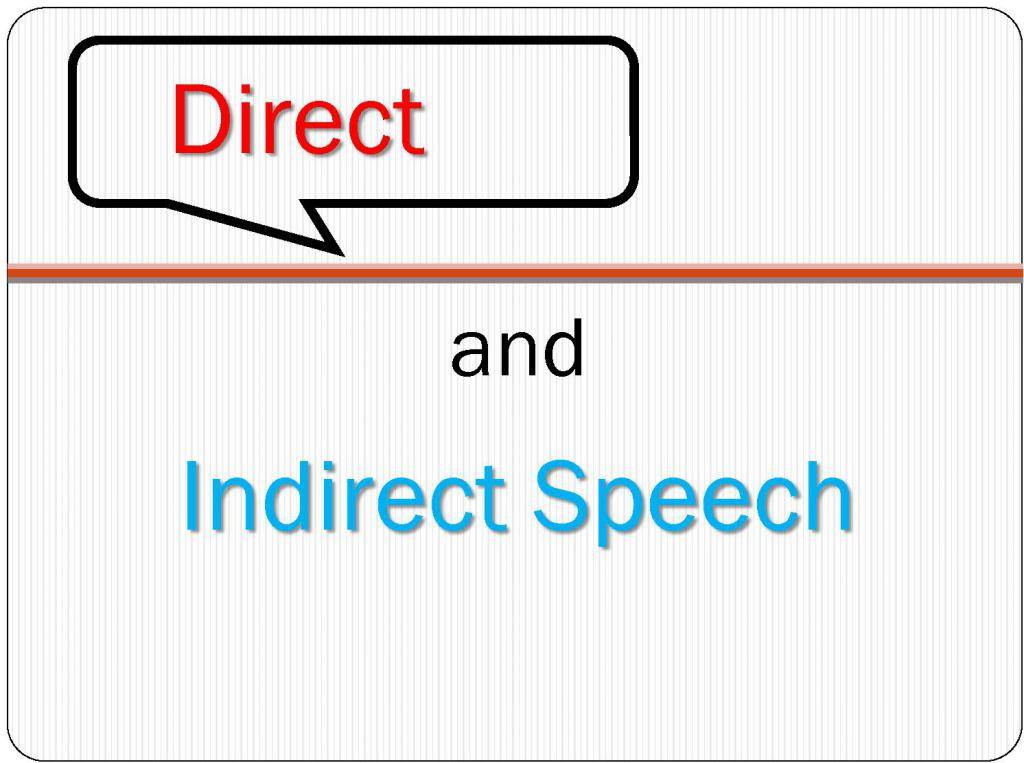
Прямая речь представляет собой чужую, переданную без изменений речь и оформляется следующим образом:
- слова автора отделяется от прямой речи точкой или запятой;
- чужая речь заключается в кавычки;
- кавычки ставятся сверху;
- знаки препинания — внутри кавычек.
Косвенная речь передает чужую речь, выражая содержание фразы, но не сохраняя, при этом, особенностей стилистики владельца, чьи слова были переданы
Для передачи такой речи на письме важно учитывать следующие моменты:
- косвенная речь иногда вводится союзом или вопросительным словом;
- в кавычки не ставится;
- вопросительный и восклицательный знаки, запятая опускаются.
При переходе грамматических форм английских глаголов в косвенную речь работает правило согласования времен.
Ниже даны примеры и упражнения на косвенную речь в английском языке.
| Direct Speech | Reported Speech |
| Present Simple | Past Simple |
|
My friends said, “We want to go to Madrid.” — Мои друзья сказали: «Мы хотим поехать в Мадрид». |
My friends said that they wanted to go to Madrid. — Мои друзья сказали, что хотят поехать в Мадрид. |
| Present Continuous | Past Continuous |
|
Alice said, “I am playing golf now.” — Алиса сказала: «Сейчас я играю в гольф». |
Alice said that she was playing golf then. —Алиса сказала, что она играет в гольф. |
| Present Perfect | Past Perfect |
|
Maria claimed, “Yon haven’t told us the whole truth.” — Мария воскликнула: «Ты не рассказал нам всей правды». |
Maria claimed that he hadn’t told them the whole truth. — Мария воскликнула, что он не рассказал им всей правды. |
| Past Simple | Past Perfect |
|
My mum informed me, “Kate phoned you yesterday.” — Мама проинформировала меня: «Кейт тебе звонила вчера». |
My mum informed me that Kate had phoned me the day before. —Мама проинформировала меня, что вчера мне звонила Кейт. |
| Past Continuous | Past Perfect Continuous |
|
Jemma said, “My grandmother was watering the flowers.” —Джемма сказала: «Бабушка поливала цветы». |
Jemma said that her grandmother had been watering the flowers. — Джемма сказала, что ее бабушка поливала цветы. |
| Future Simple | Future-in-the Past |
|
He asserted, “I will repair my table tomorrow.” —Он утверждал: «Завтра я отремонтирую стол». |
He asserted that he would repair his table the next day. — Он утверждал, что на следующий день отремонтирует стол. |
Упражнения. Переведите следующие предложения в косвенную речь.
- She said, “I want to try some juice.”
- He claimed, “You have not play the guitar.»
- Jessy promised, “I will show you the right way.”
Если Вы устали учить английский годами?
Наши читатели рекомендуют попробовать 5 бесплатных уроков курса «АНГЛИЙСКИЙ ДО АВТОМАТИЗМА» с Анастасией Божок.
Те, кто посещают даже 1 урок узнают больше, чем за несколько лет!
Удивлены?
Без домашки. Без зубрежек. Без учебников
Из курса «АНГЛИЙСКИЙ ДО АВТОМАТИЗМА» Вы:
- Научитесь составлять грамотные предложения на английском без заучивания грамматики
- Узнаете секрет прогрессивного подхода, благодаря которому Вы можете сократить освоение английского с 3 лет до 15 недель
- Будете проверять свои ответы мгновенно + получите доскональный разбор каждого задания
- Скачаете словарик в форматах PDF и MP3, обучающие таблицы и аудиозапись всех фраз
Exercise 3. Напишите предложения в косвенной речи.

- «She doesn’t know the latest news,» he said.
- «I can store 3 GB of music on this,» said Nick.
- «We have been using this software for two years,» said Troy.
- «I’ve always loved this song,» said Betty.
- «She will copy the CD for me,» Tom told Bill.
- «I am considering a career in showbusiness,» Ken told his sister.
- «I downloaded the program for you,» said Jane.
- «I can’t get this device to work,» said Steven.
- «You mustn’t press this button,» said Fran.
- «I was plying video games all night,» said Bob.
Answers: 1. He said that she didn’t know the latest news. 2. Nick said that he could store 3 GB of music on that. 3. Troy said that they had been using that software for two years. 4. Betty said that she had always loved that song. 5. Tom told Bill that she would copy the CD for him. 6. Ken told his sister that he was considering a career in show business. 7. Jane said that she had downloaded the program for me. 8. Steven said he couldn’t get that device to work. 9. Fran said that I mustn’t press that button. 10. Bob said that he had been playing video games all night.
Повелительное наклонение в косвенных предложениях
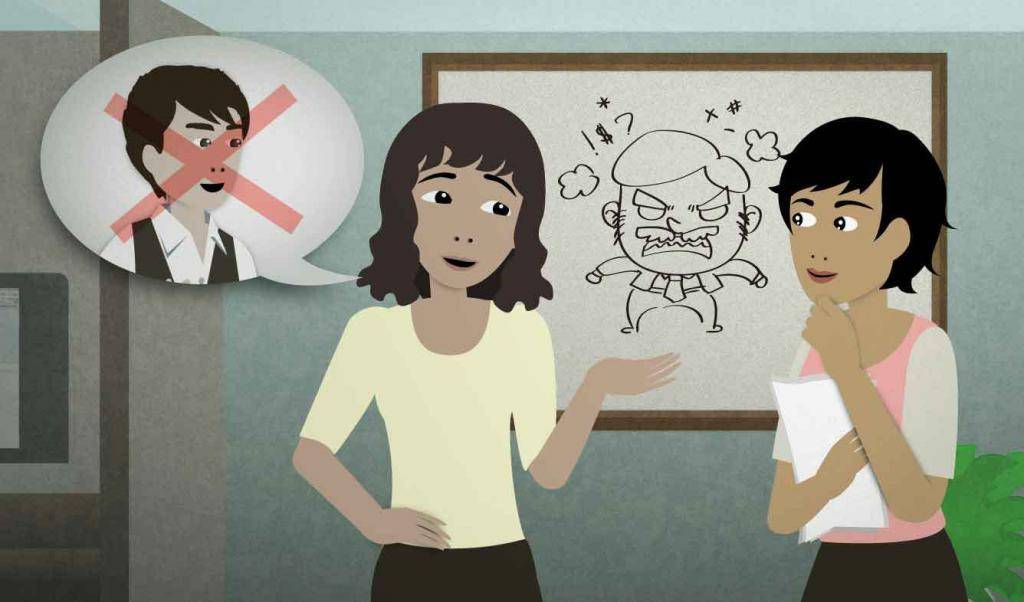
При переводе повелительных предложений в косвенную речь следует принимать во внимание следующие нюансы:
- утвердительные предложения вводятся to + инфинитив;
- отрицательные предложения — not to + инфинитив;
- знаки препинания опускаются;
- согласование времен не соблюдается.
Если прямая речь выражает приказ или запрет, то глагол to say в придаточном предложении меняется на один из глаголов to tell, to order, to forbid и др. Если же в прямой речи отображена вежливая просьба, то в косвенной речи глагол to say меняется на to ask.
Примеры:
| Direct Speech |
Reported Speech |
|
Sean said, “Please, sing me a song.” — Шон сказал: «Спой мне песню, пожалуйста». |
Sean asked me to sing him a song. —Шон попросил меня спеть ему песню. |
|
Robert said to Miranda, “Don’t smoke.” —Роберт сказал Миранде: «Не кури». |
Robert told Miranda not to smoke. —Роберт велел Миранде не курить. |
|
“Can I have some tea?” She asked. — «Можно мне чай»? она попросила. |
She asked for some tea. — Она попросила чай. |
|
Dad said to me, “Don’t go out”. — Папа сказал мне: «Не выходи». |
Dad forbade me to go out. — Папа запретил мне выходить. |
Выполните следующие упражнения в косвенной речи в английском языке:
- The father asked daughter, “Show me this boy.”
- John asked me, “Bring me some sugar, please.”
Косвенная речь: упражнения на утвердительные предложения
Ниже будут приведены упражнения на умение использовать косвенную речь. Упражнения будут затрагивать самые разные аспекты и части данной темы, поэтому постарайтесь выполнить их все. Также к каждому упражнению будут даны ответы.
Упражнение 1
Вам даны несколько предложений с прямой речью на английском языке. Ваша задача – перевести их в косвенную речь, соблюдая все нюансы и особенности данной темы.
- “I am really sure that Emily and Peter will be great math teachers for their little kids at school” Mike said.
- “When I came to the room, Dilan was in my sofa. He was reading a newspaper or a new book” Tomas said.
- Mr. Crush said “Children, actually, I do not know when the conference starts. Ask anyone else, please.”
Здесь вы можете найти ответы на упражнение выше:
- Mike said that he was really sure that Emily and Peter would be great math teachers for their little children at school.
- Tomas said that when he had come to the room, Dilan had already sat in his sofa. He had been reading a newspaper or a new book.
- Mr. Crush said to us that he really did not know when the conference started. He said to ask anyone else, please.
Упражнение 2
Вам дана ситуация: вы недавно встретили своего друга, и он рассказал вам много интересного. Напишите, что он вам сказал, используя косвенную речь.
- “I was playing computer games with my best friend Ben from 10 till 15 and eating a lot of unhealthy and junk food the day before yesterday.”
- ”Will you take part in the competition of future young artists with your classmates from art school next month?”
- “I am really happy to become a top pupil in my specialized class. My parents also are so happy about this.”
Ответы:
- Dilan said that he had been playing computer games with his best friend Ben from ten till fifteen and eating a lot of unhealthy food they day before that day.
- Dilan asked me if I would take part in the future competition of young artists with my classmates from art school the following month.
- Dilan said that he was really happy to become a top pupil in his specialized class. And also he said that his parents were so happy about this.
Упражнение 3
Задание наоборот. Вам нужно из косвенной речи построить прямую. Довольно легко, не правда ли?
- Oleg said to his friends that his room had been in the second floor but then it was in the third floor.
- My English teacher said to me that he could read my translation of that interesting books about relationships of girls and boys.
- Peter said that he had seen strange people at his parents` house the previous year. He was a little bit afraid.
Ответы:
- Oleg said to his friends “My room was in the second floor last year but now it is in the third floor.”
- My English teacher said to me “Now I can read your translation of this interesting books about school relationships of girls and boys.”
- Peter said “I saw strange people at my parents` house last year. I was a little bit afraid.”
Упражнение 4
Вам даны предложения с косвенной речью. Вам необходимо вставить на место пропусков told или said согласно их смыслу и употребления.
- Alice ____ (said or told) his parents that she was really happy because she had passed all of her school exams the previous week.
- Colin ____ (said or told) that his girlfriend had already read about one hundred books in English and Spanish.
- The poor man once ____ (said or told) to the rich man that his house was wild and could kill his horse easily.
Ответы:
- told;
- said;
- told.

